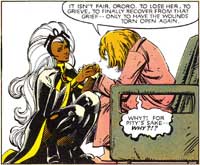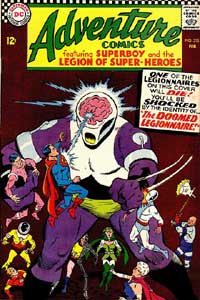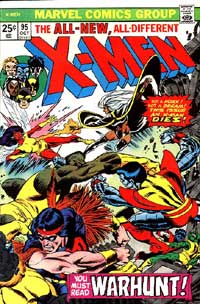Comics /
Cult Favorite
Death, Take a Holiday!
By Philip Schweier
October 1, 2003 - 08:46
"In this issue, SOMEBODY DIES!!"
"Who will survive the awesome onslaught of THE MURDERER?!!
"VOTE on who will live and who will die! Just call 1-900-KILL HIM!"
yawn.
Used to be the notion of a super-hero being killed was a landmark decision. Ferro Lad in the Legion of Super-Heroes is the earliest one that I can recall. In a story written by Jim Shooter, he gave his life to protect 30th Century Earth from The Suneater. Years later, while Editor-in-Chief at Marvel, Shooter would execute Phoenix of the X-Men.
But it wasn't long after the much ballyhooed Death of Phoenix saga that a revolving door opened to the fictional afterlife. Ironically, it may have been opened not by a comics character, but by Mr. Spock in the third Star Trek movie. Supposedly, Leonard Nimoy had decided he'd had enough of his Vulcan counterpart, and asked that Spock perish in The Wrath of Khan. Producers had left the film open-ended, allowing him to reprise the role when he allegedly had a change of heart.
Ever since the mid-80s, killing off a major character has become a cliché. We've seen it done a million times, with the unfortunate soul resurrected in dozens of ways. Rest in Peace carries as much weight as Get Well Soon. We've seen it done so often, it's become a joke. But even when it crossed the line into parody, it became tiresome, and South Park producers and writers retired the whole "Oh my God! They killed Kenny!" thing.
All sorts of heroes were returned from the dead, either by being cloned, or through sorcery, or they-weren't-really-dead-that-was-their-Evil-Twin-who-died. Kryptonian science, Shi'ar technology, and Indian mysticism have all played their part. And let us not forget the ever-popular, "It was all a dream."
Sometimes, the character is sacrificed on the Altar of Boosting Sales. In X-Men #95, Thunderbird perished almost immediately following his introduction in Giant-Sized X-Men #1. As he was somewhat of a blend of Colossus and Wolverine, it may be his entire purpose was to add to initial drama of the new team.
Many comics fans feel a little jaded, believing these events to be a marketing ploy on the part of the publisher. We expect that it won't be long before they'll be resurrected somehow, or someone else will assume their mantle and become the NEW Robin, or the NEW Flash or NEW Green Lantern.
Even the mainstream media has fed the hype machine, with extensive coverage of the deaths of Robin and Superman. Granted, the latter was never intended to become such an overblown event. We can blame the likes of USA Today for that, for wanting to suggest that DC would indeed kill off what is one of this century's major pop culture icons, thereby putting an end to a multi-million dollar merchandising empire.
Riiight.
So a character will die. DC's Crisis on the Infinite Earths had the right idea, to lay redundant or under-used characters to rest, or breathe new life into ideas that had gone stale. While it does stimulate interest in a particular title, this is a temporary fix at best.
It has been proved in film all the big Hollywood names, and all the high-priced special effects will not effectively make for a good movie. Often, a movie centers around stunts without even coming close to telling a good, entertaining story. The result is dismal box office earnings, tarnished star quality, and often vicious attacks in the press. Despite the hype, despite the well-oiled publicity machine, the film in question becomes the punchline of jokes at next year's Academy Awards.
The latest title to jump on the homicidal bandwagon is Top Cow's Witchblade, in which in issue #75, readers will see the results of their poll on who should live and who should die. Apparently, it was the idea of Top Cow President Matt Hawkins to have readers vote.
Beginning with issue #70, readers can log onto www.wizarduniverse.com and submit their votes on who should live. As the series progresses, the dead pool will be whittled down to four possible candidates by #74, and in #75, two characters will get the ax.
In my opinion, it's a hackneyed idea on the part of the Witchblade creative team. I'll give them credit for allowing fans to choose their victims, but that can be construed as wimping out. They want to do away with the least popular characters, so as not to alienate too much of their readership.
For any writer or editor looking to write the death of a character, I have a few suggestions.
For one, dignity counts for a lot. The Death of Captain Marvel in 1982 portrayed his passing with a great deal of drama and feeling. Mar-Vell didn't die at the hand of Thanos or some other all-powerful villain. He died from cancer, plain and simple. It's touching to have a character suffer their demise in a way to which we can all relate.
Not every super-hero has to sacrifice himself that others might live, and not all villains must be done in by their own devices. Such tiresome plot devices have been done, well, to death.
I'd like to see a villain be put on trial, convicted, and sentenced to death. But ironically, it seems the only time the death penalty is ever applied in the world of super-heroes is when someone is wrongly convicted, and it's up to Lois Lane or Batman to prove their innocence. I realize putting the Joker to death for his crimes would remove an integral character from the Batman mythos, but he could always escape prison while on appeal.
The death of the White Tiger in the the pages of Daredevil #40 was a bold example of a hero meeting his end under less-than-noble circumstances. While the demise of a "third rate super-hero wannabe" (according to writer Brian Michael Bendis) isn't altogether noteworthy in the annals of Marvel Comics, it was a rare case in which the event served the story, instead of the other way around.
You know what would be original? Have a hero be the victim of a street crime, or a drunk driver. I know that sounds harsh, and maybe cruel, but that's what Death is. It's painful, it's random, and it has an impact that goes way beyond a single issue of a comic book.
Once in a while, the intent is not to eventually resurrect a dead character, but simply to enhance the drama of the story. One of the most poignant fictional deaths to me was that of Colonel Henry Blake on M*A*S*H. I liked Henry. He and I were from the same small town in Illinois. That final scene, in which Radar comes into the OR and reads that Henry's plane had been shot down was incredibly effective because nobody expected it. Not even the cast was told. Their instructions were to stay in character and react accordingly.
The producers took some heat for killing off a much-loved character needlessly, but their defense was that such is the nature of war. In an earlier episode of M*A*S*H, Blake explains that Rule #1 in war is that good men die. Rule #2 is that doctors can't change Rule #1.
Nor can super-heroes. For all their strength or speed or whatever abilities they may possess, they can't prevent Death from eventually having its way. Because of that, it brings these meta-humans, these Marvels, down to the level of normal human beings.
Death ought to serve the nature of the narrative, not as a way to temporarily boost sales. If Death within the realm of comic books is to genuinely count for something, it must not be relegated to a plot device for when writers run out of ideas .
Praise and adulation? Scorn and ridicule? Email me at philip@comicbookbin.com
Last Updated: March 3, 2025 - 20:40



